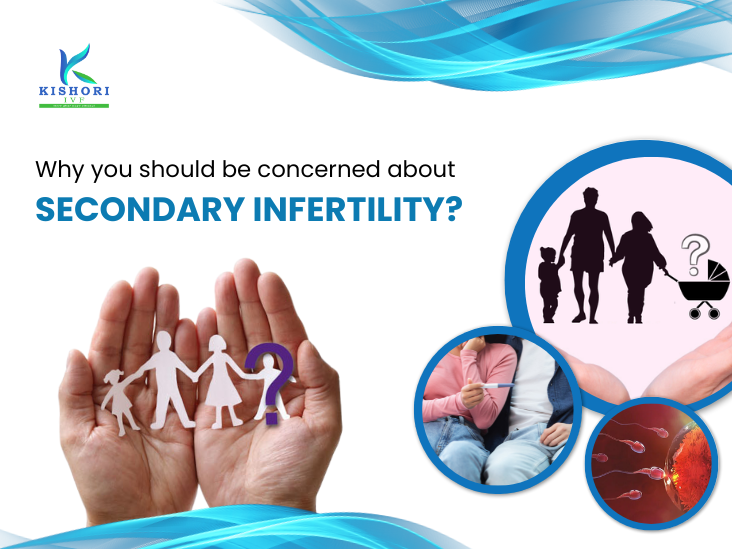
Why you should be concerned about secondary infertility?
Secondary infertility, a puzzle, presents itself as the inability to become pregnant or maintain a pregnancy after successfully conceiving in the past. Couples often grapple with this perplexing challenge when, despite previously experiencing the joys of parenthood, they encounter difficulties conceiving again.
Exploring the Root Causes
The origins of secondary infertility are intricate and diverse, frequently stemming from fertility issues in either partner. Let’s go deeper into the underlying causes:
In Men:
- Age-Related Factors: Advancing age can affect male fertility, leading to reduced sperm production and diminished semen quality, especially after the age of 40.
- Testosterone Decline: Testosterone, a critical hormone for sperm production, decreases over time or due to genital injuries.
- Abnormal Sperm Morphology: Sperm can undergo structural changes, affecting their motility and ability to fertilize eggs. This transformation may result from infections, testicular trauma, toxic exposures, or other causes.
- Azoospermia Challenge: Azoospermia, the absence of viable sperm in ejaculate, presents a significant hurdle to male fertility.
- Prostate Enlargement: Enlarged prostate glands can reduce sperm count and impede ejaculation.
- Prostatectomy Complications: Surgical removal of the prostate gland, often necessary for conditions like cancer, can disrupt natural sperm flow.
- Late-onset hypogonadism (LOH): This age-related syndrome leads to a decrease in testosterone production, contributing to fertility issues.
- Varicocele Troubles: Varicoceles, caused by faulty valves in scrotal veins, can negatively impact sperm production and quality.
- Weight Gain: Excessive weight gain increases the risk of azoospermia by 39% and reduces sperm count by 11% in men.
For Women:
- Maternal Age: Women over 35 experience a natural decline in both egg quality and quantity.
- Endometriosis: This condition occurs when endometrial tissue abnormally spreads to places outside the uterus, including the ovaries, hindering fertility.
- Blocked Fallopian Tubes: Infections like chlamydia or gonorrhea can damage or block fallopian tubes, preventing eggs from reaching the uterus and causing infertility.
- Polycystic Ovary Syndrome (PCOS): PCOS disrupts ovulation and menstrual cycles due to elevated androgens, and male sex hormones.
- Weight-Related Issues: Weight gain can lead to PCOS and other health problems, affecting ovarian function in susceptible women.
Aside from these complexities, secondary infertility can also be linked to medical conditions such as diabetes, hypertension, and depression, as well as the medications used to treat them. These factors can disrupt hormonal balance, making conception challenging for both men and women.
Options for Women:
Clomid Treatment: Women facing ovulatory issues may find relief through Clomid, an oral medication that stimulates egg-producing hormones.
Uterine Procedures: Surgical interventions may involve removing obstinate uterine growths that hinder fertility, such as scar tissue, polyps, and fibroids.
Laparoscopic Surgery: This minimally invasive surgery can help repair impaired or blocked fallopian tubes and address conditions like fibroids and endometriosis.
In-Vitro Fertilization (IVF): IVF is a complex procedure involving the retrieval of eggs, their fertilization in a laboratory, and their subsequent implantation in the uterus.
Options for Men:
Intrauterine Insemination (IUI): IUI is a strategic approach that involves directly depositing sperm into the uterine cavity. It is especially beneficial for men with low sperm counts or poor sperm quality.
Testicular Surgery: Surgical procedures can address varicoceles that affect sperm quantity and quality.
Supplementary Support: Antioxidant and anti-aging supplements have the potential to enhance male fertility, while medications can improve sperm health.
Conclusion:
The question of secondary infertility casts a shadow over couples who have previously enjoyed the gift of natural conception. It serves as a stark reminder that numerous lifestyle factors and health conditions contribute to this complex narrative. However, with the right medical guidance and interventions, many couples can overcome these challenges and fulfill their dreams of completing their families.
Contact Kishori IVF today and get your parenthood journey started.
Book your Appointments for any kind of treatment with Kishori IVF.
Call/WhatsApp: 7608-961-332/7381-060-332 to book an Appointment
Follow us on Facebook and Instagram for more.

